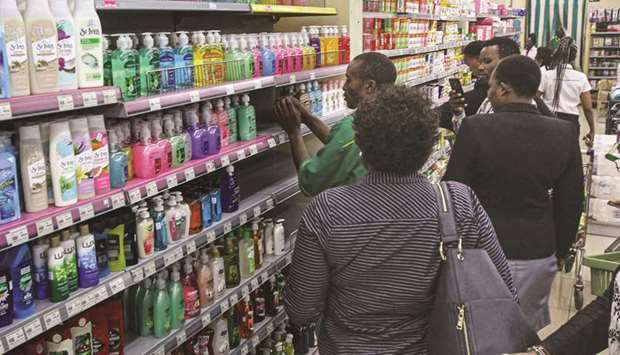Kenya, Ethiopia, Sudan and Guinea all confirmed their first cases of the new coronavirus yesterday, giving the disease a foothold in 18 countries on the African continent.
Africa had until now largely been spared the rapid spread of Covid-19, which has infected at least 127,000 people and killed 4,700 worldwide.
Most of Africa’s reported cases were foreigners or people who had travelled abroad.
Rapid testing and quarantines have been put in place to limit transmission. But concerns are growing about the continent’s ability to handle the disease.
Cases have been reported in Morocco, Tunisia, Egypt, Algeria, Senegal, Togo, Cameroon, Burkina Faso, Democratic Republic of Congo, South Africa, Nigeria, Ivory Coast, Gabon, Ghana, Guinea, Sudan, Kenya and Ethiopia.
The numbers of cases in most of the countries are still in single figures.
Senegal confirmed 11 new cases yesterday, raising the total in the West African nation to 21.
The Health Ministry said 16 had been infected by the same man who had returned from Italy.
Among those confirming cases yesterday, Kenya is the richest economy in East Africa and a hub for global firms and the United Nations, while Ethiopia is Africa’s second-most populous nation, with 109mn people.
Addis Ababa and Nairobi are regional transit hubs.
In Nairobi, the Kenyan authorities banned all major public events and said they would restrict foreign travel. The mayor of Addis Ababa urged citizens to avoid close personal contact but Ethiopia’s health minister said there were no plans to cancel flights.
Kenyan Health Minister Mutahi Kagwe said the country’s first case, a 27-year-old Kenyan, was diagnosed on Thursday after travelling home via London on March 5.
He said the government had traced most of the people she had been in contact with, including fellow passengers on her flight, and a government response team would monitor their temperatures for the next two weeks.
The Ethiopian case was a 48-year old Japanese national who arrived in Ethiopia on March 4, the Health Ministry said.
Guinea’s first case was an employee of the European Union delegation who had self-isolated after she felt ill upon returning from Europe, the EU delegation said.
Sudan’s first confirmed coronavirus case was a man who died on Thursday in the Sudanese capital Khartoum, the Health Ministry said.
He had visited the United Arab Emirates in the first week of March.
Kenyan Health Minister Mutahi Kagwe said the government had suspended all public gatherings, sporting events, open-air religious meetings and events “of a huge public nature”. Schools will remain open but inter-school events were suspended.
Public transport operators must install hand sanitisers in their vehicles and clean them regularly, Kagwe said, while foreign travel would be restricted.
Soon after the announcement, shoppers in one Nairobi supermarket were buying up cart loads of staples like maize flour and water, as well as hand sanitisers and soap.
Kenya Airways suspended flights to China last month and on Thursday added Rome and Geneva to the list of suspended destinations.
Kenya, which relies heavily on Asian imports, has seen disruptions to its supply chain and a decline in tourism, an important source of hard currency and jobs.
“We are going to be hit badly,” Tourism Minister Najib Balala told journalists.
Mauritius, an island nation off the coast of East Africa whose economy depends on tourism and financial services, has yet to report any Covid-19 cases but said it was offering liquidity to banks to support struggling firms hit by the impact of the virus and cutting banks’ cash reserve requirements.

People stand in an aisle to buy liquid soaps after the stock of disinfectants ran out at supermarkets in Kenya in Nairobi, yesterday.
